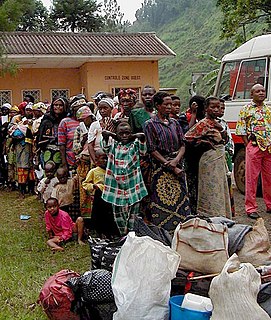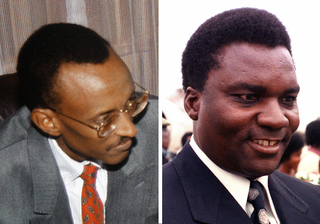
Rwanda is a developing country that has undergone rapid industrialisation thanks to successful government policy. Since the early-2000s, Rwanda has witnessed an economic boom improving the living standards of many Rwandans. The Government’s progressive visions have been the catalyst for the fast transforming economy. The President of Rwanda, Paul Kagame, has noted his ambition to make Rwanda the "Singapore of Africa".
Human occupation of Rwanda is thought to have begun shortly after the last ice age. By the 16th century, the inhabitants had organized into a number of kingdoms. In the 19th century, Mwami (king) Rwabugiri of the Kingdom of Rwanda conducted a decades-long process of military conquest and administrative consolidation that resulted in the kingdom coming to control most of what is now Rwanda. The colonial powers, Germany and Belgium, allied with the Rwandan court.
The Hutu, also known as the Abahutu, are a Bantu ethnic or social group native to the African Great Lakes region of Africa, primarily area now under Burundi and Rwanda. They mainly live in Rwanda, Burundi, and the eastern Democratic Republic of the Congo, where they form one of the principal population divisions alongside the Tutsi and the Twa.

Paul Kagame is a Rwandan politician and former military leader. He is currently the President of Rwanda, having taken office in 2000 when his predecessor, Pasteur Bizimungu, resigned. Kagame previously commanded the rebel force that ended the 1994 Rwandan genocide. He was considered Rwanda's de facto leader when he served as Vice President and Minister of Defence from 1994 to 2000. He was re-elected in August 2017 with an official result of nearly 99% in an election criticized for numerous irregularities. He has been described as the "most impressive" and "among the most repressive" African leaders.

The Rwandan genocide, also known as the genocide against the Tutsi, was a mass slaughter of Tutsi in Rwanda during the Rwandan Civil War, which had started in 1990. It was directed by members of the Hutu majority government during the 100-day period from 7 April to mid-July 1994. An estimated 500,000 to 1,000,000 Rwandans were killed, constituting an estimated 70% of the Tutsi population. Additionally, 30% of the Pygmy Batwa were killed. The genocide and widespread slaughter of Rwandans ended after the Tutsi-backed and heavily armed Rwandan Patriotic Front (RPF), led by Paul Kagame, took control of the capital and the country. An estimated 2,000,000 Rwandans, mostly Hutu, were displaced and became refugees.

The Second Congo War began in the Democratic Republic of the Congo in August 1998, little more than a year after the First Congo War, and involved some of the same issues. The war officially ended in July 2003, when the Transitional Government of the Democratic Republic of the Congo took power. Although a peace agreement was signed in 2002, violence has continued in many regions of the country, especially in the east. Hostilities have continued since the ongoing Lord's Resistance Army insurgency, and the Kivu and Ituri conflicts.
The Rwanda Defence Force is the national army of Rwanda. The country's armed forces were originally known as the Rwandan Armed Forces (FAR), but following the victory of the Rwandan Patriotic Front in the country's civil war in 1994, it was renamed to the Rwandan Patriotic Army (RPA), and later to its current name.

The Rwandan Civil War was a conflict between the Rwandan Armed Forces, representing the government of Rwanda, and the rebel Rwandan Patriotic Front (RPF). The war, which lasted from 1990 to 1994, arose from the long-running dispute between the Hutu and Tutsi groups within the Rwandan population. A 1959–1962 revolution had replaced the Tutsi monarchy with a Hutu-led republic, forcing more than 336,000 Tutsi to seek refuge in neighbouring countries. A group of these refugees in Uganda founded the RPF which, under the leadership of Fred Rwigyema and Paul Kagame, became a battle-ready army by the late 1980s.

This article lists the Prime Ministers of Rwanda since the formation of the post in 1961, to the present day. A total of eleven people have served in the post. The current Prime Minister of Rwanda is Édouard Ngirente, who took office on 30 August 2017.

The Akazu was an informal organization of Hutu extremists whose members contributed strongly to the 1994 Rwandan Genocide. A circle of relatives and close friends of Rwanda's then-president Juvénal Habyarimana and his influential wife Agathe Habyarimana, they were also called the "Zero Network", for their goal of a Rwanda with zero Tutsi.

The Amahoro Stadium, also known as Amahoro National Stadium, is a multi-purpose stadium in the Gasabo district of Kigali, Rwanda. With a capacity of 30,000, it is the largest stadium in Rwanda and hosts football matches, concerts, and public events. The football clubs Armée Patriotique Rwandaise F.C. and Rayon Sports F.C. are the tenants. The venue is also sometimes used for rugby union.
Gérard Prunier is a French academic and historian specializing in the Horn of Africa and the more southerly African Great Lakes region.
Radio Muhabura was a radio station of RPF during the Rwandan Civil War from 1990 to 1994. It was created in 1991 and broadcast from Uganda. It was the first alternative to Radio Rwanda, reaching all but the south of Rwanda by mid-1992. It was recorded by the BBC starting in 1992. It promoted armed resistance to the "extremist" Rwandan government. In an October 1992 broadcast it claimed that militia forces of the government's party had "devised traps aimed at exterminating the youth." As early as January 1993, months before the RTLM went on-air, Radio Muhabura accused the Rwandan government of genocide. It routinely denied RPF involvement in civilian killings, and promoted resistance to "Hutu power", to the Habyarimana government, and desertion by the military.

Mount Bisoke is an active volcano in the Virunga Mountains of the Albertine Rift, the western branch of the East African Rift. It straddles the border of Rwanda and the Democratic Republic of the Congo, but the summit is located in Rwanda. It is located approximately 35 km northeast of the town of Goma and adjacent Lake Kivu.

Human rights in Rwanda have been violated on a grand scale. The greatest violation is the Rwandan genocide of Tutsi in 1994. The post-genocide government is also responsible for grave violations of human rights.
This timeline of Rwandan history is a chronological list of major events related to the human inhabitants of Rwanda.

United Nations Security Council resolution 955, adopted on 8 November 1994, after recalling all resolutions on Rwanda, the Council noted that serious violations of international humanitarian law had taken place in the country and, acting under Chapter VII of the United Nations Charter, established the International Criminal Tribunal for Rwanda (ICTR).













